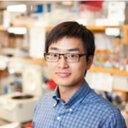Unprecedented sugar bridged bisindoles selective inhibiting glioma stem cells.
Keywords
Abstract
Unlike reported bisindoles linked by single bond directly, alstoniasidines A (1) and B (2), from Alstonia scholaris featuring unprecedented skeleton with two indole moieties bridged by a sugar, represented a novel bisindole type having strictosamide-glucopyranose-picraline scaffold. Both compounds exhibited selective cytotoxicity against human glioma stem cells (GSCs) and induced caspase-3 dependent extrinsic apoptosis by increasing the expression of interleukin 1 (IL-1), tumor necrosis factor (TNF-α), and the cleaved caspase-3, while damaged the unlimited proliferation and self-renewal capacity of GSCs. This finding might provide new type of leads for the selective killing of human glioma stem cells.


